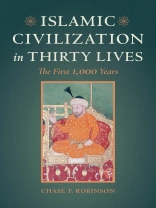Religious thinkers, political leaders, lawmakers, writers, and philosophers have shaped the 1, 400-year-long development of the world’s second-largest religion. But who were these people? What do we know of their lives and the ways in which they influenced their societies?
In
Islamic Civilization in Thirty Lives, the distinguished historian of Islam Chase F. Robinson draws on the long tradition in Muslim scholarship of commemorating in writing the biographies of notable figures, but he weaves these ambitious lives together to create a rich narrative of Islamic civilization, from the Prophet Muhammad in the seventh century to the era of the world conquerer Timur and the Ottoman Sultan Mehmed II in the fifteenth.
Beginning in Islam’s heartland, Mecca, and ranging from North Africa and Iberia in the west to Central and East Asia, Robinson not only traces the rise and fall of Islamic states through the biographies of political and military leaders who worked to secure peace or expand their power, but also discusses those who developed Islamic law, scientific thought, and literature. What emerges is a fascinating portrait of rich and diverse Islamic societies. Alongside the famous characters who colored this landscape—including Muhammad’s cousin ’Ali; the Crusader-era hero Saladin; and the poet Rumi—are less well-known figures, such as Ibn Fadlan, whose travels in Eurasia brought fascinating first-hand accounts of the Volga Vikings to the Abbasid Caliph; the eleventh-century Karima al-Marwaziyya, a woman scholar of Prophetic traditions; and Abu al-Qasim Ramisht, a twelfth-century merchant millionaire.
An illuminating read for anyone interested in learning more about this often-misunderstood civilization, this book creates a vivid picture of life in all arenas of the pre-modern Muslim world.
Tabela de Conteúdo
Preface
Conventions, abbreviations & equivocations
Introduction
Part 1
Islam & Empire
1.Muhammad the Prophet
2.‘Ali cousin, caliph and forefather of Shi‘ism
3.‘A’isha wife of the Prophet
4.‘Abd al-Malik engineer of the caliphate
5.Ibn al-Muqaffa‘ translator and essayist
6.Rabi‘a al-‘Adawiyya renunciant and saint
7.al-Ma’mun caliph-patron
Part 2
The Islamic Commonwealth
8.‘Arib courtesan of caliphs
9.al-Hallaj ‘the Truth’
10.al-Tabari traditionalist rationalist
11.Abu Bakr al-Razi free-thinking physician
12.Ibn Fadlan intrepid envoy
13.Ibn Muqla vizier, scribe, calligrapher?
14.Mahmud of Ghazna conqueror and patron
15.al-Biruni cataloguer of nature and culture
Part 3
A Provisional Synthesis
16.Ibn Hazm polemicist, polymath
17.“Karima al-Marwaziyya hadith scholar
18.al-Ghazali ‘Renewer’ of Islam
19.Abu al-Qasim Ramisht merchant millionaire
20.al-Idrisi cosmopolitan cartographer
21.Saladin anti-Crusader hero
22.Ibn Rushd (Averroes) Aristotelian monotheist
Part 4
Disruption & Integration
23.Rumi Sufi ‘poet’
24.Rashid al-Din physician, courtier and global historian
25.al-Hilli paragon of Shi‘ism ascendant
26.Ibn Taymiyya stubborn reactionary
27.Timur sheep-rustler, world-conqueror
28.Ibn Khaldun social theorist and historian
29.Mehmed II conqueror and renaissance man
30.Shah Isma‘il esoteric charismatic
Glossary
Suggestions for Further Reading
Notes
Bibliography
Sources of Illustrations
Index
Sobre o autor
Chase F. Robinson was Lecturer and Professor of Islamic History in the Faculty of Oriental Studies and Fellow of Wolfson College at the University of Oxford from 1993 until 2008, when he was appointed Distinguished Professor of History and Provost of the Graduate Center of the City University of New York, where he now serves as President. His extensive publications on Islamic history include Islamic Historiography, Empire and Elites after the Muslim Conquest, and The New Cambridge History of Islam, Volume 1.







![Capa do Brian Schrag & Julisa Rowe: Community Arts for God's Purposes [Chinese] 貼近神心意的社群藝術 Capa do Brian Schrag & Julisa Rowe: Community Arts for God's Purposes [Chinese] 貼近神心意的社群藝術](https://static.worldofdigitals.com/thumb_webp/740/9781645083740.webp)




